Contrasting Creative Paths: Hiromu Arakawa and Eiichiro Oda's Approaches to Anime Adaptation

In the ever-evolving world of anime, two legendary series stand out not only for their captivating stories but also for the distinct approaches their creators took during their adaptations. Hiromu Arakawa's "Fullmetal Alchemist" and Eiichiro Oda's "One Piece" have amassed massive audiences and critical acclaim, but the creative styles of their respective authors reveal fascinating contrasts. While both series have established themselves as titans in the shonen genre, their creators have fundamentally different philosophies about involvement in adaptations. This article delves into these contrasting approaches, examining how both Arakawa and Oda shaped their anime while exposing the nuances in their artistic processes.
Understanding Fullmetal Alchemist’s Legacy
Fullmetal Alchemist: Brotherhood serves as a follow-up to the initial series 2003 Fullmetal Alchemist series, has earned the title of the second most popular anime on My Anime List. Both adaptations touched upon the same rich narrative, but the original was modified due to its timing with the ongoing manga. It faced challenges in finding a fitting conclusion, leading to the inclusion of fillers and a unique ending not found in the manga.
The Role of Ongoing Manga in Adaptations
During the early production of the 2003 anime, the manga was in progress. This led to creative decisions that reflected an urgent need to fit an entire narrative into a limited timeframe. The resulting fillers and original plots were significant choices made by the anime staff, setting the stage for discussions on adaptation integrity.
Hiromu Arakawa’s Involvement
In an enlightening interview about the 2017 live-action adaptation of Fullmetal Alchemist, Hiromu Arakawa openly addressed her level of participation in these transformations. Surprisingly, she expressed a hands-off approach, stating, “I’m looking forward to the finished work,” emphasizing her belief in trusting specialists to execute the adaptation.
A Unique Perspective on Trust
Arakawa’s trust in the anime staff extended beyond the live-action film. She reiterated how her philosophy influenced the anime adaptation itself. Her humorously candid admission about being an author who doesn’t heavily engage in the adaptation process spoke volumes about her confidence in her team’s capabilities.
Character Representation Over Visuals
What truly matters to Arakawa is not the visual representation of characters but their authentic essence. She expressed a desire for the anime staff to capture the core of her characters rather than fixating on how they appeared. This creative distance illustrates her larger vision for Fullmetal Alchemist.
Eiichiro Oda's Hands-On Approach
In stark contrast, Eiichiro Oda has cultivated a more direct involvement in the adaptations of One Piece. His diligent presence throughout the anime’s production reveals a starkly different attitude compared to Arakawa’s approach. Oda’s busy schedule does not hinder him from assuming a vital role, often offering suggestions and feedback during the creative process.
Value of Collaboration with Directors
Oda has expressed a significant amount of trust in the anime’s former director, appreciating the crew’s ability to tailor the original narrative to better fit the animated context. His willingness to collaborate with skilled directors demonstrates his belief in finding a balance between originality and adaptation.
Navigating Live-Action Adaptations
The differences become even more pronounced with Oda’s approach to Netflix’s adaptation of One Piece. His level of oversight in this project was far more pronounced, requiring that every aspect pass through his lens. This oversight accentuates Oda’s devotion to upholding the authenticity of the One Piece universe.
Synergy versus Independence
While Hiromu Arakawa exemplifies a strategy of independence, relying on creative teams to realize her vision, Eiichiro Oda demonstrates a powerful synergy between creator and adaptation, ensuring that the spirit of the original is maintained—even as changes are made to accommodate different formats.
The Impact of Their Choices on Fans
Fans of both series have benefited from their creators’ choices, leading to adaptations that resonate profoundly. The nuanced narratives, compelling characters, and emotional weight present in both anime adaptations have become staples in the anime community.
Fullmetal Alchemist vs. One Piece: A Cultural Impact
Both series transcend the medium, influencing myriad adaptations in various forms of entertainment. They each carve out a unique space within the cultural zeitgeist, shaping discussions about character development, storytelling, and adaptation integrity.
Lessons in Adaptation
Arakawa and Oda’s divergent styles offer valuable insights into the process of adaptation. Their experiences reveal how trust in collaborators can either empower creative freedom or necessitate creative oversight. Each strategy adapts to the unique demands of storytelling, producing wildly successful and beloved works.
Legacy and Influence
The legacies of Fullmetal Alchemist and One Piece continue to thrive, each supported by their creators’ choices. As new adaptations emerge and the cultural landscape shifts, the principles these creators established will undoubtedly guide future artists seeking to transform their stories into the animated realm.
Future of Adaptations
The anime industry is in a constant state of evolution, with new technologies and storytelling methods emerging. Understanding the intricate dynamics of these adaptations, as embodied by Arakawa and Oda, will be crucial for future creators looking to strike the right balance between honoring original material and adapting it for modern audiences.
Where to Experience These Works
For those eager to dive into these masterpieces, both Fullmetal Alchemist and One Piece are available for reading through Viz Media, while their respective anime adaptations currently stream on platforms like Crunchyroll, ensuring their adventures can be experienced by new and returning fans alike.
Through analysis of Hiromu Arakawa and Eiichiro Oda’s contrasting philosophies, we gain a deeper appreciation for the art of adaptation in the anime industry. Their creations not only offer amusement but also offer profound lessons in collaboration, trust, and the essence of storytelling that resonates across cultures and generations.
- Mariana Rocha 07 Oct 2024

